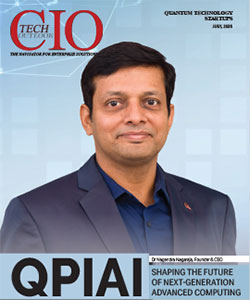Navigating the Ethical Frontier: Transforming Software Engineering in the Era of AI-Driven Development
Varun Shah, Software Development Manager, Amazon Services LLC
 Varun Shah is a dynamic software professional with over 15 years of expertise in Java and J2EE technologies. Proficient in architecting, designing, and developing high-performance web applications, he excels at building scalable N-tier and distributed solutions. In an exclusive interview with CIOTech Outlook, he shares his views on how developers can transform their software operations with AI integration.
Varun Shah is a dynamic software professional with over 15 years of expertise in Java and J2EE technologies. Proficient in architecting, designing, and developing high-performance web applications, he excels at building scalable N-tier and distributed solutions. In an exclusive interview with CIOTech Outlook, he shares his views on how developers can transform their software operations with AI integration. Could you elaborate on the methods or techniques that would be employed to ensure the transparency and interpretability of AI algorithms in the development process?
Ensuring transparency and interpretability of AI algorithms is imperative for fostering trust, regulatory compliance, and stakeholder understanding. Several methods and techniques can be employed to achieve this goal. Firstly, comprehensive documentation detailing the model architecture, input-output relationships, and decision-making process enhances transparency. Visualizations such as decision trees and feature importance plots elucidate the model's inner workings, aiding interpretation. Additionally, techniques like sensitivity analysis and feature importance analysis help stakeholders understand the factors driving model predictions. Local explanation methods provide insights into individual predictions, fostering interpretability. Ethical considerations and fairness assessments mitigate biases, promoting transparency and fairness. Rigorous testing and validation procedures ensure that AI models perform as intended and adhere to predefined criteria. Finally, stakeholder engagement throughout the development process facilitates understanding and acceptance of AI-driven decisions. By employing these methods and techniques, organizations can enhance the transparency and interpretability of AI algorithms, fostering trust and accountability in AI development.
AI-driven development is revolutionizing the way we approach software engineering, automating tasks and improving efficiency. Can you elaborate on how AI-driven development is changing traditional software engineering processes?
AI-driven development is fundamentally reshaping traditional software engineering processes by introducing automation, intelligence, and optimization at every stage of the software development lifecycle. Through AI algorithms, tasks that were once manual and time-consuming, such as code generation, testing, and debugging, are now automated, significantly accelerating development cycles and improving overall efficiency. Moreover, AI-driven tools enhance software quality assurance by autonomously identifying defects, predicting potential failures, and optimizing test coverage. Natural language processing (NLP) techniques facilitate better requirements analysis, while predictive analytics enable proactive project management and risk mitigation. Personalized user experiences, powered by AI, enhance user satisfaction and engagement, further enhancing the value proposition of software products. Continuous integration and deployment pipelines leverage AI to streamline release processes and optimize resource allocation. Overall, AI-driven development represents a paradigm shift in software engineering, enabling organizations to achieve greater agility, innovation, and competitiveness in today's dynamic technological landscape.
Continuous learning is essential in AI-driven development as algorithms evolve and new techniques emerge. How should we promote continuous learning and skill development among software engineers to keep up with advancements in AI-driven development?
Promoting continuous learning and skill development among software engineers is vital to staying abreast of advancements in AI-driven development. Firstly, establishing a culture of learning within organizations encourages engineers to pursue professional development opportunities actively. Providing access to comprehensive training programs, workshops, and online courses tailored to AI technologies enables engineers to acquire new skills and stay updated on industry trends. Additionally, fostering collaboration and knowledge-sharing platforms encourages engineers to exchange insights, best practices, and innovative ideas. Encouraging participation in conferences, seminars, and hackathons fosters networking and exposure to cutting-edge AI developments. Lastly, supporting self-directed learning initiatives and providing resources for experimentation and exploration empowers engineers to explore emerging AI technologies independently. By prioritizing continuous learning and skill development, organizations can equip software engineers with the expertise needed to thrive in the dynamic landscape of AI-driven development.
In AI-driven development, algorithms continuously learn and adapt to changing environments, enabling software systems to become more resilient and adaptive. What challenges do you foresee in ensuring the reliability and stability of AI-driven software systems as they continuously learn and adapt?
Ensuring the reliability and stability of AI-driven software systems in the face of continuous learning and adaptation presents several challenges. Firstly, maintaining model performance and preventing performance degradation over time requires ongoing monitoring and retraining to adapt to evolving data distributions and environmental changes. Additionally, ensuring algorithmic fairness and mitigating biases becomes more complex as models evolve, potentially leading to unintended consequences or ethical concerns. Furthermore, managing the complexity of increasingly sophisticated AI models poses challenges in terms of interpretability, transparency, and accountability, making it difficult to understand and validate model behavior. Moreover, ensuring regulatory compliance and addressing privacy concerns amidst evolving regulations and societal expectations adds another layer of complexity. Finally, managing security risks, such as adversarial attacks and data poisoning, becomes critical as AI systems become more interconnected and autonomous. Addressing these challenges requires a multidisciplinary approach encompassing robust governance frameworks, rigorous testing and validation processes, ongoing monitoring and maintenance, and ethical considerations throughout the AI development lifecycle.
Ethical considerations become paramount in AI-driven development .How can we propose integrating ethical considerations into the development process of AI-driven systems, and what role do software engineers play in this regard?
Integrating ethical considerations into the development process of AI-driven systems is crucial to ensure responsible innovation and mitigate potential societal risks. Firstly, organizations should establish ethical guidelines and governance frameworks that outline principles and best practices for ethical AI development and deployment. These guidelines should address issues such as fairness, transparency, accountability, privacy, and bias mitigation. Software engineers play a pivotal role in implementing these ethical principles throughout the development lifecycle. They must proactively identify and mitigate ethical risks, such as algorithmic biases or unintended consequences, during the design, development, and deployment stages. Additionally, engineers should prioritize ethical considerations in decision-making processes, advocating for the adoption of responsible AI practices and challenging unethical practices when necessary. Furthermore, fostering a culture of ethical awareness and continuous education within engineering teams is essential to promote ethical behavior and ensure adherence to ethical standards. By integrating ethical considerations into the development process and empowering software engineers to prioritize ethics, organizations can build AI-driven systems that benefit society while minimizing potential harms.




